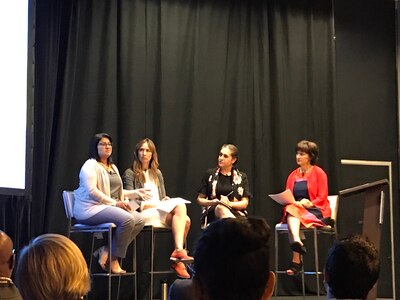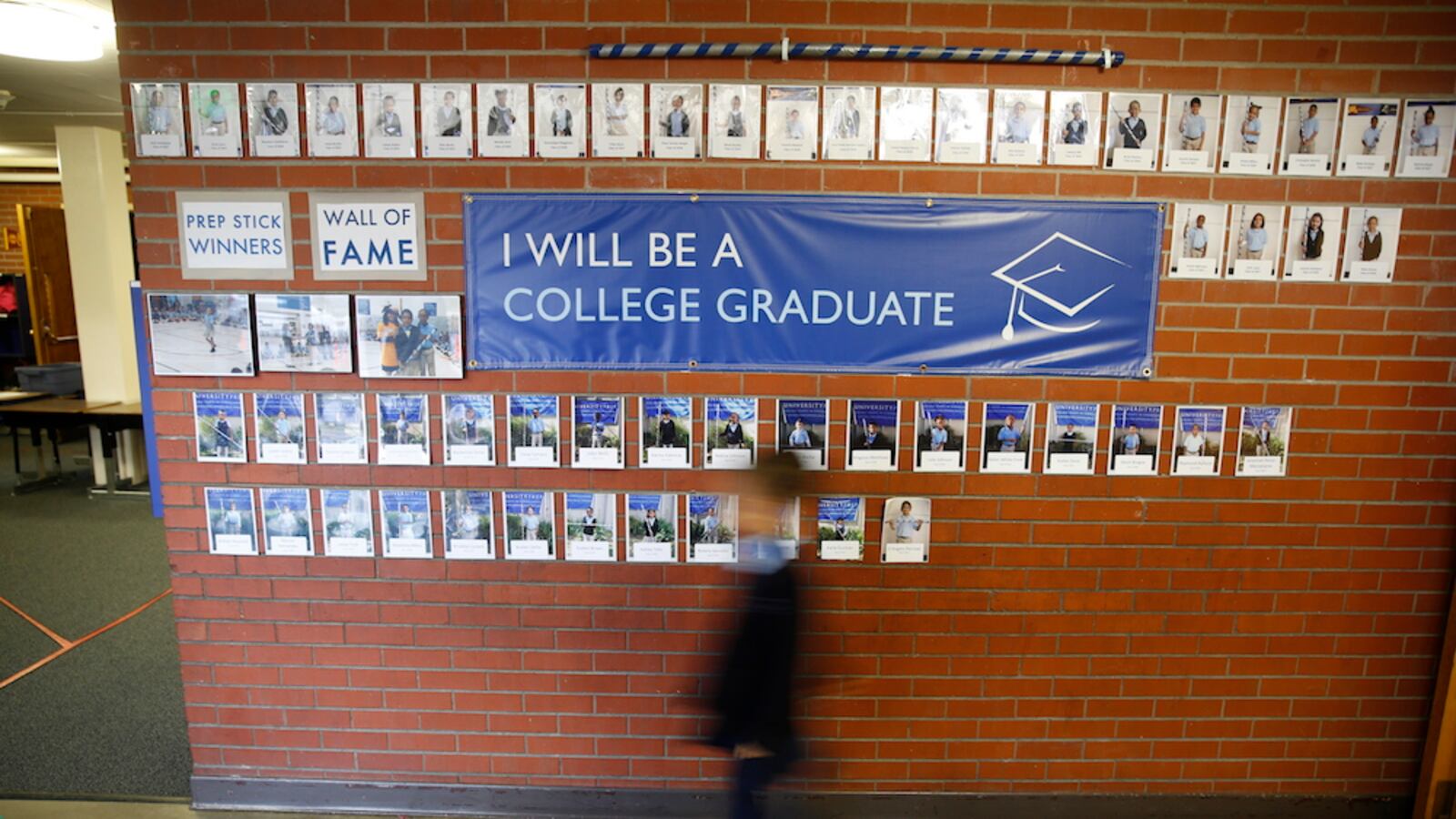Charter schools are on “the chopping block.” There’s a national effort to “charter bust.” Many charter schools are “under attack.”
Such was the mood at an annual convening of supporters of charter schools and education technology in Oakland last week. During panel discussions at the NewSchools Venture Fund Summit, advocates and school leaders said they were worried about declining political support nationally and unionization efforts among their own staffers.
“When we were writing our first charter, it was 2008,” said Kriste Dragon, CEO of Citizens of the World Charter Schools. “If I had to think of the biggest shifts since then, the barriers to entry feel greater — politically, obviously. Financially, too.”
The event offered a look at how charter leaders from across the country are coming to grips with new limits on their growth and political clout. And there are signs that their anxiety is warranted, with charters losing support particularly in blue states and cities and among Democrats.
NewSchools attendees were reminded of the opposition when dozens of protestors, organized by the Oakland Education Association, gathered outside the conference hotel downtown. One of their chants: “Hey, hey, ho, ho, charter schools have got to go.”
“They are a leech onto the public system,” said Harley Litzelman, an Oakland teacher who protested at the event.
But charter backers also used the event to explain how they’re planning to confront what they see as the danger posed by teachers unions, internal and external.
“Our movement is facing an existential threat,” said Myrna Castrejón of the California Charter Schools Association, speaking about the proposed legislation in California that would halt charter expansion. “We are mobilizing — gloves off, in your face — across the state.”
🔗Opposition to charter schools has ratcheted up
It’s easy to overstate the trouble the charter school movement finds itself in. The number of charter schools opening each year has fallen, but enrollment is still growing, and schools continue to expand, often thanks to federal grants. Wealthy funders have spent millions backing sympathetic politicians and nonprofits. And as more and more students attend charters, their families form a stronger political constituency.
Still, there are many indications that charters face strong headwinds. Polls show that Democrats are increasingly skeptical of charter schools, though support remains stronger among black and Hispanic Democrats. Nationally, striking teachers — sometimes targeting their ire at charter schools — have won support from the public and from politicians. And charter schools face real or potential limits on growth in some states and cities, like New York City, Chicago, and Denver. Democrats in the U.S. House recently proposed cutting funds for the federal Charter Schools Program.
An analysis commissioned by the National Alliance for Public Charter Schools, shared with attendees at the conference, painted a grim picture.
“There is a pretty organized and heartfelt and strong opposition to the charter sector,” said Seth Reynolds of the Parthenon Group. “There is not a great counter narrative or political response to that.” That’s something charter advocates have struggled with in some past political fights, like the push to raise Massachusetts’ charter cap that failed to drum up grassroots support to match that of teachers unions.
One challenge some see is a disconnect between the charter leaders and the communities they work in.
NewSchools itself has dramatically increased the number of attendees who identify as black or Hispanic and funded efforts to diversify the leadership of education organizations. “Rooms like this have changed significantly,” said Roblin Webb, the founder and CEO of Freedom Prep charter schools in Memphis. “There’s far more emphasis on people of color leading schools where we serve kids of color and we serve kids in poverty.”
There’s also a question of what issues charter advocates focus on.
“Most of us in education reform have refused to lock arms with our families and our children in their communities on stuff like affordable housing, on stuff like food insecurity, on stuff like trauma,” said Tosha Downey at the Memphis Education Fund.
Castrejón of the California Charter Schools Association said her organization will be rolling out a messaging campaign in the coming months and plans to mobilize families. Legislators who vote for bills to limit charters “will do so looking in the eyes of our students and our families who will be impacted by their actions,” she said.
The fast-growing IDEA charter network, founded by Tom Torkelson, has a similar strategy. “What we have been trying to do is put our parents and our students forward in front of as many elected officials and business leaders and community leaders as possible,” he told Chalkbeat last month.
Charter leaders also say they’re running up against a growing reluctance to close existing schools, inhibiting their own ability to grow.
“You have a ton of schools that are open that are failing kids, period, whether they’re charters or district schools,” said Webb, speaking about Memphis. “The district has not gotten to the place where are they are holding those schools accountable and closing them so that schools of quality can continue to open.”
But that gets to the heart of opposition to charter school expansion: as some schools grow, others tend to shrink. In places where the student population is steady or declining, having more students attending charter schools adds to the financial pressure on school districts to close schools. (Research on school closures has shown that their effects depend on whether students end up at substantially better schools.)
Marika Iyer, an Oakland teacher who protested outside the NewSchools summit, sees the planned closures of 24 Oakland district schools as a consequence of charter growth that will ultimately hurt students.
“This is one of the ways, materially, where charter expansion is something our students have to deal with starting next year,” she said.
🔗Charters are worried about teachers trying to unionize in their own schools
Meanwhile, some charter leaders are as worried about what they see as a problem in their own ranks: charter school teachers going on strike or hoping to unionize.
A session at NewSchools on the topic was moderated by the Center for Education Reform’s Jeanne Allen, a staunch critic of teachers unions.
“For years the unions were on the defensive,” said Allen. But unions’ “patient, dogged pursuit has gained traction.”
Rates of unionization in charters remain low. In the 2016-17 school year, just over 10 percent of charter schools were unionized, a share that has held steady since 2009. But in places like Chicago, charter unionizing efforts have made headlines, and the city has seen three charter teacher strikes this school year.

Dahlia Aguilar, the chief schools officer of the Washington, D.C. charter school Mundo Verde, described an ongoing effort to unionize as “antithetical to everything we’ve ever done or been or represented.”
“It is our very ability to be autonomous, to be nimble, to be flexible that’s at stake,” she said.
Shannah Varon, executive director of Boston Collegiate Charter School, said she had staved off teacher discontent over high executive pay, including her own, by giving all teachers a $1,000 bonus, being more transparent about the school’s finances, and creating clear structures for teachers to play a role in decision making.
Teachers “felt like they were holding the moral high ground, and that I from the leadership team have lost touch with what kids really needed — and that was probably the biggest driver of their concerns,” she said.
“Things have stabilized at Boston Collegiate,” said Varon. “But is is possible that one day I’ll have lost the trust again such that they’ll be like, ‘Damn straight I want to organize’? Yeah.”
A recent analysis by the Center on Reinventing Public Education found that unionizing efforts in charter schools are often spurred by a breakdown of trust between teachers and administrators, as well as frustration with working conditions.
Contrary to fears of some charter advocates, there’s little evidence that unionization hurts student performance. One California study found it had no long-term effect, and another found it helped students academically.
Some charter leaders suggested that issues of school funding more broadly have contributed to opposition to charter schools and interest in unionizing. “We are living in a moment of perceived and real scarcity,” said Castrejón. “We ought to engage by calling attention to those issues.”
But generally, philanthropies that have supported charter schools, including the Bill and Melinda Gates and Walton Family foundations, have not focused on advocating for more funding for all schools.
Is that changing?
The California Charter Schools Association is not listed as a supporter of a major, union-backed 2020 ballot initiative to raise taxes in California for schools and other public services. But that ballot initiative is supported by the Chan Zuckerberg Initiative, one of the philanthropies supporting NewSchools and targeted by Oakland protesters. (The money came from CZI’s “justice and opportunity” division, not its education group.)
In Los Angeles, CCSA endorsed a local effort to increase taxes for schools, charter and district alike; the initiative has has been partially bankrolled by pro-charter donor Eli Broad. (Chan Zuckerberg, Gates, and Walton are all funders of Chalkbeat.)
Elizabeth Shaw — the CEO of Chicago International Charter Schools, which recently experienced a two-week teachers strike at four of its schools — said she empathized with teachers’ fight for higher pay, though she criticized their decision to strike.
“I’m not blaming the teachers for this,” she said. “How have we gotten to a point — not just as charters, because Red For Ed is national — where teachers are willing to sit out of their classrooms … to get what they believe in and what they deserve?


